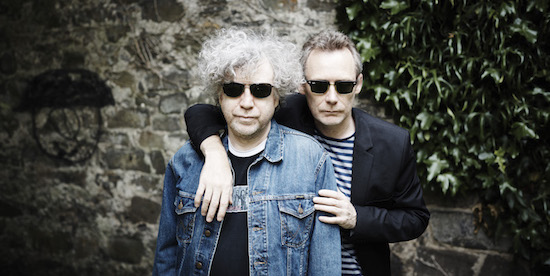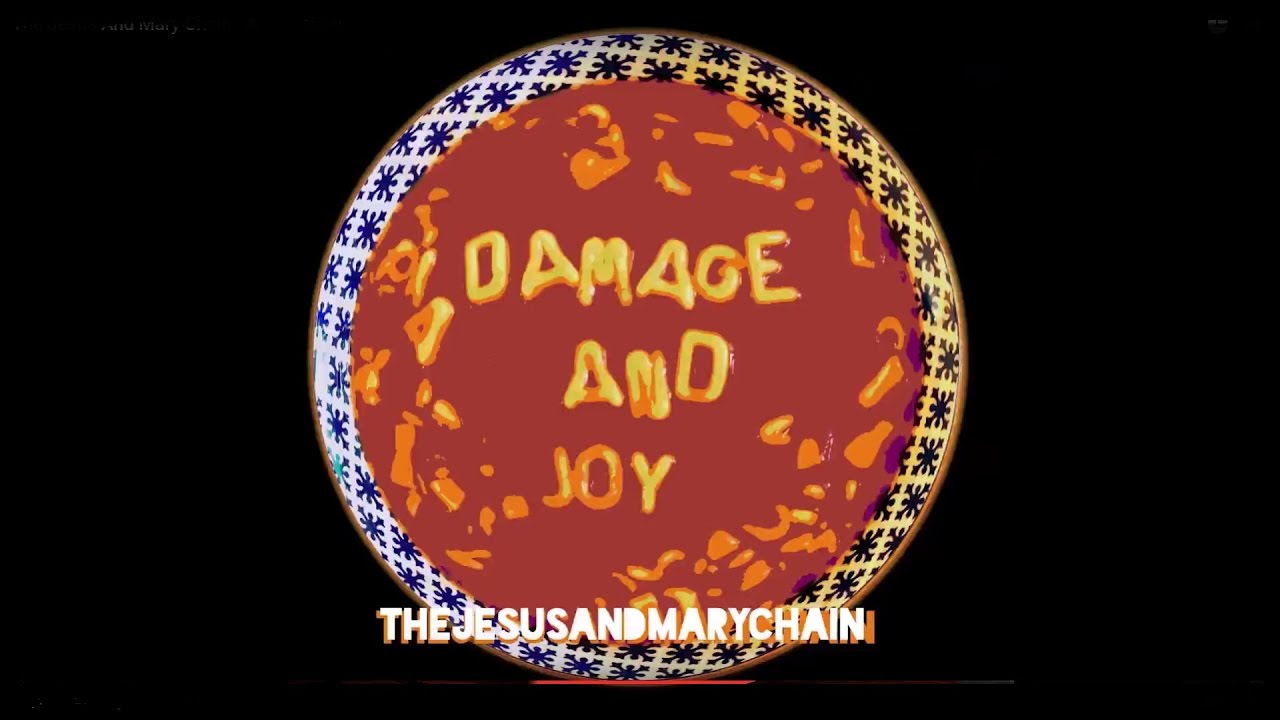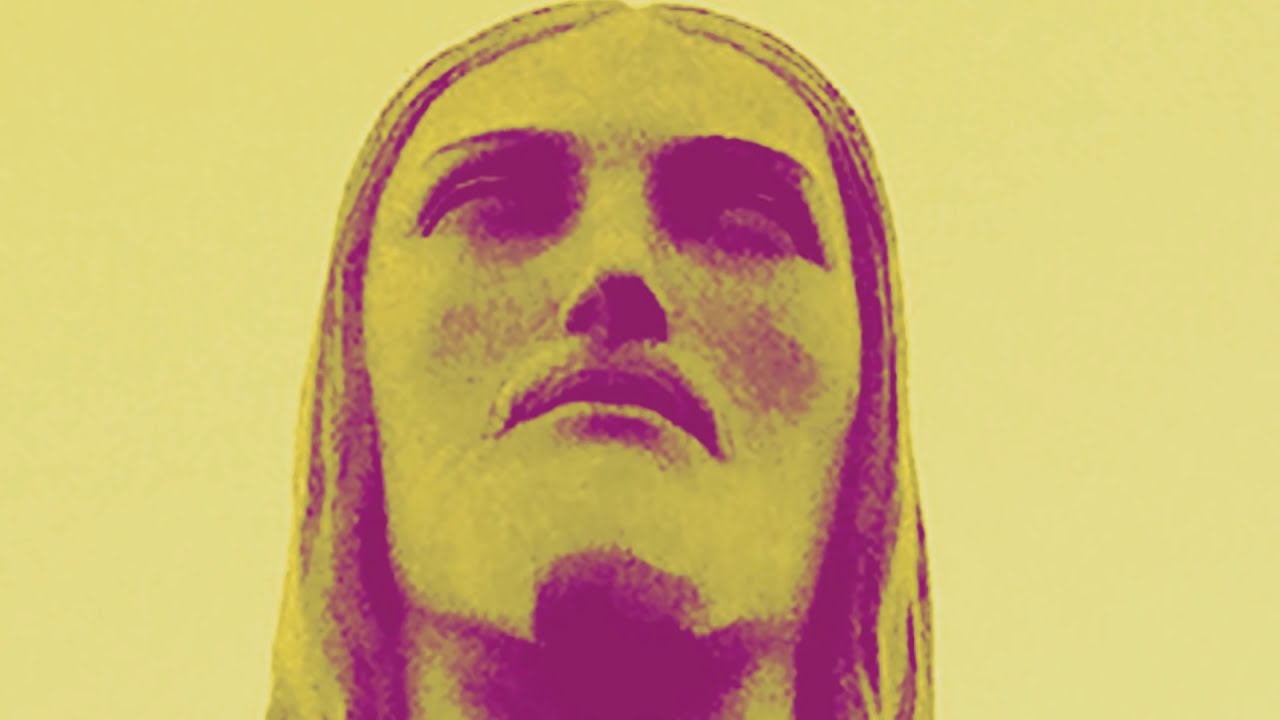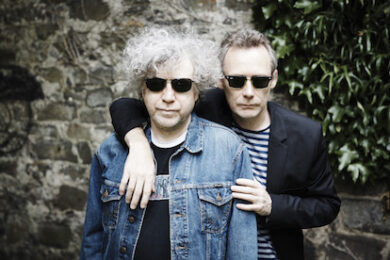On March 24, The Jesus & Mary Chain release Damage And Joy, their first album of new material in 19 years.
Produced by Youth, the 14-track LP also features guest vocals from Isobel Campbell, Sky Ferreira and Jim and William Reid’s younger sister Linda. The track ‘Always Sad’, released as a single last month, features Jim singing alongside previously unknown vocalist Bernadette Denning. Damage And Joy is the band’s seventh album, and the follow-up to 1998’s Munki. The Jesus & Mary Chain originally split in 1999, but reformed in 2007 for shows at Coachella and in London as part of that year’s Meltdown Festival. Since then they’ve continued to play live, including a 2015 world tour in which they performed their debut album Psychocandy in full, 30 years after its original release.
In 2008 a new song, ‘All Things Must Pass’, was featured on the soundtrack to the TV show Heroes, leading to expectation that an album would follow. In fact, the track was eventually included on 2010’s Upside Down: The Best Of The Jesus And Mary Chain. In 2011 Jim Reid posted a demo track, ‘Black And Blues’ on Soundcloud, but then all went quiet again.
The Reid brothers’ notoriously fractious relationship was assumed to be the reason for their reluctance to go back into the studio. Nevertheless, sessions for the new album finally began in Spain in September 2015, and whereas for Munki the two brothers had recorded their contributions separately, Damage And Joy found them collaborating in the studio together, although most of the songs were individually written beforehand.
Several of the album’s 14 tracks have been previously available in different forms. In addition to a re-recorded ‘All Things Must Pass’ (now titled ‘All Things Pass’), and ‘Black And Blues’, first single ‘Amputation’ is a reworking of Jim Reid’s 2006 solo single ‘Dead End Kids’. The album also includes a new take on his 2005 single ‘Song For A Secret’, and three numbers originally performed by his post-Mary Chain band Freeheat in 2000: ‘The Two Of Us’, ‘Facing Up To The Facts’ and ‘Get On Home’.
‘The Two Of Us’ was also included on the 2005 album Little Pop Rock by Sister Vanilla, a virtual secret Mary Chain album that found Jim and William acting as writers and musicians behind Linda Reid on vocals. A reprise of the Sister Vanilla single, ‘Can’t Stop The Rock’, with Linda singing, is the closing track on Damage And Joy.
William Reid’s contributions display the band’s long-held interest in the seedy underbelly of American culture, on ‘Los Feliz (Blues And Greens)’, ‘Presedici (Et Chapaquiditch)’ and ‘Simian Split’, which includes controversial lyrics referring to the death of Nirvana’s Kurt Cobain: "I killed Kurt Cobain / I put the shot right through his brain / His wife gave me the job / ‘Cos I’m a big fat lying slob".
Despite the songs’ varied origins, Damage And Joy has a remarkable consistency and sounds like a classic Jesus & Mary Chain album that could easily have appeared at any time after 1989’s Automatic. Jim Reid took the time to talk to us about their return to the studio, and how it felt to still be in love/hate with rock n’ roll in 2017.
It’s been about ten years since the band first reformed. How come it took you so long to record a new album?
Jim Reid: Various reasons, really. I was a bit nervous about getting back into the studio again. The last record that The Mary Chain had done, before this, was Munki, which was incredibly difficult to do. So I thought if it’s going to be at all like that I’m not sure that I’d want to do a record. So I kept putting it off, and over the years people kept saying oh, you’re doing a new record, when is it out? So I thought, Christ, we’re going to actually have to record a record or tell people that we’re not going to do it. So I sat down and talked to William and we decided it was now or never. That was a couple of years ago, and we decided to go with it.
It doesn’t sound like you were exactly chomping at the bit to get back into the studio.
JR: We wanted to have a record out. We had a bunch of songs that I wanted to get out there. It’s just that I was nervous about being stuck in a studio, possibly for months on end, with William, and the same old shit going down, basically. It was a weird one, because I did want to do a record but I didn’t want that. And in the end I just thought, we’ll have to try it and see how it goes.
A lot of the tracks on there have been available in different forms before, haven’t they? The first single, ‘Amputation’, is a reworking of your 2006 solo single ‘Dead End Kids’. Other songs had been previously recorded by your band Freeheat, or on the Sister Vanilla album. What made you decide to do that?
JR: Those versions were very obscure, and I just didn’t want those songs to disappear into obscurity. And also the stuff that was recorded previously, I would say that I was perhaps the worse for wear at the time and when they came out hardly anybody was aware of them. They were recorded almost as demos; that’s what they should’ve been. So I just wanted them to have the Mary Chain brand on them, and give them the treatment that they deserved.
The new version of ‘Facing Up To The Facts’ is quite different. The original Freeheat version is very harsh and nihilistic, both musically and lyrically, whereas the new version is a lot more positive. Does this reflect where you’re at now as opposed to how you were feeling back then?
JR: Yeah. I was never happy with the original version of ‘Facing Up To The Facts’. So I reworked that just before we went into the studio and I thought, this is the track that it was always meant to be.
What was it like working with Youth as a producer?
JR: It was very good. He understood what we were looking for and so it was very painless.
It’s been suggested that he was quite effective in a peacekeeping role as well.
JR: That was one of the reasons that we thought a producer might be a good idea: obviously to produce, but also to have someone in the studio if the shit hit the fan, who would be able to defuse the situation. As it turned out, that wasn’t necessary. We got on pretty well in the studio this time, so it was just production duties that we needed Youth for and I think he did a good job. He also played bass on the whole album, which was great.
The album has a classic Mary Chain sound but there’s also this glorious, squelchy analogue-sounding synth as the extra texture on several tracks, in some ways replacing the feedback noise of old.
JR: I’ve always been a bit of a sucker for that white noise synth sound, yeah. We’ve used it a few times on Mary Chain records in the past, and I guess it’s part of our box of tricks.
Another element of your arsenal is using guest female vocalists. There are a few different women singing on Damage And Joy, including Isobel Campbell, Sky Ferreira and your younger sister Linda. On the new single ‘Always Sad’ it’s a singer named Bernadette Denning, who I’m not familiar with.
JR: She’s not a professional singer; she’s never been in a band before. She’s William’s girlfriend. We just thought we’d give her a crack at it and it sounded great. But then we’ve got Linda singing on ‘Can’t Stop The Rock’, Isobel Campbell on ‘The Two Of Us’ and ‘Song For A Secret’, and Sky Ferreira singing on ‘Black And Blues’. With Isobel I just love her voice. I’m a fan of her music but I hadn’t ever met her before. It was just a case of making a phone call to find out if she’d do it, and she was up for it, so that was great. Sky had come to see us in America a couple of years ago. We knew she was a Mary Chain fan, but we’d sort of forgotten all about that and we were asking around among people that we knew who we should get to sing on our album. And she’d just done that thing with the Primals [‘Where The Light Gets In’ from last year’s Chaosmosis album], so I talked to Bobby to see if he had any ideas and he said to ask Sky, so I did that and she was keen.
Lyrically there’s an element of self-reflection and looking back to many of the songs. On ‘Presedici (Et Chapaquiditch)’ you mention various glam rock bands and favourite movies that you were into when you were growing up before the chorus "Behind black eyes my mind is fine / If you can’t love yourself it’s bad for your health". It seems like there’s a sense of acceptance, of who you are and where you’ve come from.
JR: William wrote that song, but I think it’s just about looking back on our childhood. I sang it on the album, and it just made me think of me and William sitting watching Top Of The Pops when I was eleven, with Mud and T-Rex and all of that. Listening to the chart rundown on a Sunday and all those kind of things.
You’ve always referenced American culture a lot in your songs and this album is no exception. The Kennedys are in there, and on ‘Los Feliz- Blues And Greens’ you sing about "America, the land of the free, wishing they were dead."
JR: Again, that’s William’s song, and you have to remember he’s lived out in LA for 16 years now. There’s a kind of version of American culture that we were very much into when the band started, but it’s a version of America that’s long since gone. I wouldn’t say that I’m particularly into modern American culture. William would have to talk for himself, but the version of America that I loved when I was growing up definitely doesn’t exist anymore. I can’t say that there’s much coming out of America that interests me at the moment. It’s a scary place right now.
You obviously have a lot of American fans; do you think the exoticism runs both ways? I was lucky enough to see you play in Austin last year on the Psychocandy tour, when you had the old documentary film of East Kilbride playing behind you, and even though you use a lot of American imagery and reference points, in that context suddenly the band’s Scottishness seemed very pronounced.
JR: The East Kilbride thing was just for that particular tour, so it’s not like we’ve made a career out of being The Proclaimers or whatever. It’s more that there’s a bunch of people out there who like British culture and underground British music. It’s never a mainstream kind of thing, but there are enough people out there who get into that, that British bands can go out there and do quite well, and I think we’ve done quite well out of that.
It was also good to see how young the audience was at those Psychocandy shows, both in Britain and America. There were 18 year olds singing along with ‘Never Understand’ and it was their song, not their mum’s or their dad’s.
JR: That’s great to see, and it’s been like that since the band got back together. I suppose we can put that one down to technology and the internet. Bands like The Mary Chain have done very well out of people being able to find out all about the band in an instant. It’s a combination of that and the fact that young bands will namecheck The Mary Chain, and young kids will read that and then be able to instantly find out who The Mary Chain are. In a few seconds they can look you up on YouTube, and that’s great.
You’ve sung in the past about loving rock n’ roll and about hating rock n’ roll, and the new album ends with ‘Can’t Stop The Rock’. Does rock n’ roll feel like a life sentence now, and when you were starting the band in the early eighties, could you have imagined you’d still be doing it in 2017, in your fifties?
JR: No, I wouldn’t have imagined that we’d still be doing it. Maybe making music in some shape form, but as for The Mary Chain I would’ve been astounded if somebody had said that. There are reasons for that, though. It’s more common for bands to go on longer now than it was then. Bands didn’t do that then, unless you were The Rolling Stones, whereas I can think of dozens of bands who were our contemporaries back in the eighties that are still doing it. So it’s more accepted now. But no, I wouldn’t have ever thought we’d still be doing it back then.
There have been so many bands come through since you originally broke up who are so obviously influenced by you and have borrowed huge elements of your sound. Was that one of the motivations for making a new album, the fact that you could look around and see so many young pretenders essentially doing you?
JR: There are a lot of bands out there that I don’t get, which is one of the reasons why I feel it’s time for a Mary Chain record. I’m not that in touch with what’s going on, but any time I dip my toe in the water to check out new bands I’m not really liking what I’m hearing. So I thought fuck it, it’s time for a new Mary Chain record out there. And that’s why The Mary Chain started in the first place, in the mid-eighties. We just thought the music scene was so dire, and we thought, well, we can do something. We can do better than this.
So you still have that feeling of kicking against the pricks, as it were.
JR: Well, yeah, that’s the reason to make a record, really. It’s just about not being satisfied with the status quo, so fuck it: let’s show people what it should be.
The Jesus & Mary Chain’s new album, Damage And Joy, is out on March 24





